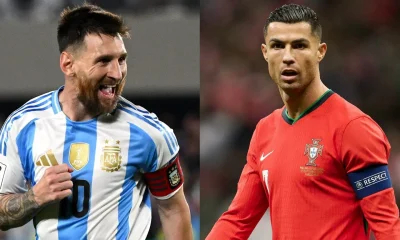Opinion
THE DECEPTIVE TACTICS OF IPOB
By Emeka Jerome
All warfare is based on deception. Hence, when able to attack, we must seem unable; when using our forces, we must seem inactive; when we are near, we must make the enemy believe we are far away; when far away, we must make him believe we are near –Sun Tzu
In the words of the revered war strategist Sun Tzu, deception is a critical component of war execution. Echoing Sun Tzu’s teachings, the proscribed Indigenous People of Biafra (IPOB) has refined the craft of deception, using a tapestry of falsehoods to advance and achieve their objectives. This treatise will highlight how the group has continually employed deception as a weapon of war to deceive gullible members, keep the public attracted to them and deepen its presence in the south east. No doubt, IPOB’s ascent to prominence was founded upon a bedrock of deception right from its inception. Spearheaded by Nnamdi Kanu, the emergence of IPOB was an outgrowth of the supposedly reformed Movement for the Actualization of the Sovereign State of Biafra (MASSOB), a pro-secessionist group that had already seen its power wane and was known for its cunning activities and propensity for violence. Although IPOB came into being in 2012, Kanu had already garnered a significant following due to his inflammatory broadcasts on Radio Biafra, a responsibility he had taken on as a member of MASSOB. Recognising that the decline of MASSOB could spell the end of his influence, Kanu, aiming to secure both relevance and financial gain, intensified his facade of advocating for Biafra’s freedom. He accomplished this by spreading propaganda against the Nigerian Government and fostering optimism among the susceptible members of the public. By rebranding and emerging as a new entity, IPOB projected an image of a fresh movement seeking self-determination while carefully avoiding associations with MASSOB’s past activities. His strategy worked because in no time, Kanu assumed command over the sphere of IPOB’s operations, rapidly ascending to its helm.
When IPOB started its brand of agitation, it was cheered on. Nnamdi Kanu became an overnight messiah. The poor vulnerable uneducated market apprentices became his ardent followers. He exploited them. Kanu adequately deployed his expertise of Radio Biafra to deceive. By broadcasting incendiary messages and misinformation, he manipulated emotions and perceptions of the public to IPOB’s advantage. The false narratives he propagated about the Nigerian Government’s actions and intentions fuelled anger and frustration among his followers. The use of hate speech and derogatory language against Government, portraying them as oppressors and enemies of the people painted a one-sided narrative of victimhood which generated sympathy for their cause, making it difficult for their followers to critically assess the situation. By leveraging international media attention, IPOB amplified their narrative on a global scale. Sensationalized headlines and stories about their activities played into their strategy, allowing them to maintain the façade of a legitimate movement fighting for self-determination while downplaying or omitting their more radical actions. The group while orchestrating actions that provoked responses from the Nigerian Government, created martyrs and gained international sympathy. Most of their tactics aimed to paint IPOB as a peaceful movement unjustly oppressed by a hostile government, thus diverting attention from their own aggressive activities. Ironical!
Unsurprisingly, Igbo diaspora across Europe and America began to join IPOB. Politicians back home were consulting its leader, Kanu. His house became a Mecca of sorts. Kanu got emboldened and then, combative. He became proud and dictatorial. His words were feared. He aspired by every means to be like Ojukwu, famed for his lionic roars. Kanu had disciples. Within this newfound position, Kanu artfully manipulated the collective sentiment, leveraging deception to foment hostility towards the government under the guise of championing the elusive cause of Biafran freedom. His financial resources began to significantly swell in different hard currencies. He skillfully garnered financial support from both the rich and the poor under the ploy of rallying donations to fuel the secessionist agenda. Simultaneously, as his personal coffers grew richer, he persistently peddled false hope to his followers, deceitfully and heartlessly portraying himself as their champion in the struggle. Kanu became bolder and went ahead to establish a military Wing, the Eastern Security Network (ESN). Operating ostensibly to counter Fulani herdsmen in the South East or so we were told, the ESN initiated a series of assaults designed to stoke the flames of ethnic conflict and destabilise the nation. Paradoxically, the reported activities of Fulani herdsmen have notably diminished, however IPOB’s actions in the region has remained persistent.
In what initially appeared to be a child’s play in the beginning, soon transformed the South East into a breeding ground for violence, marked by a surge in assassinations, bloodshed, intimidation and various forms of mayhem. Security agencies sent to the zone to restore order became targets for annihilation. The group’s orchestrations have, indeed, in the spirit of Sun Tzu’s teachings, harnessed deception’s formidable power to its advantage. Recognising that Kanu, a Nigerian based in London and his group held the potential to plunge the country into anarchy if left unchecked, the Nigerian government took proactive steps. It proscribed the group and went a step further by extraditing Kanu back to Nigeria. This was to ensure he faced charges for the chaos and destabilization he allegedly caused in the Southeastern region. In response, the group members protested and began issuing out senseless sit-at-home orders every Monday. Doom awaited whoever dared to come out on days meant for the so called sit-at home. Even school children were not spared. The young and old met same fate. For each day sit at home order was enforced, millions of naira was lost. Trading, economic, educational activities were halted. The sick does not dare to go to the hospital. Regardless of the protests voiced by the local inhabitants, IPOB ruthlessly dealt with anyone who dared to defy their directives, ironically targeting the very individuals they professed to champion and liberate. Deception at the highest core! For the people, the snake they nurtured in their bosom has now turned around to bite them.
With Kanu now in custody and facing legal proceedings, his disciple Simon Ekpa, in faraway Finland, capitalized on his mentor’s influence to achieve his own rise to prominence. Recognising the opportune moment for him to also cash out, Ekpa launched a deadlier faction called the Autopilot and afterwards the Biafra Government in Exile. He continues to give false sense of hope to liberate Biafrans while using them to swim in millions. Same as his mentor, it has now become unmistakably clear that IPOB’s motivations are primarily driven by financial gain. Under the pretext of calling for the release of Kanu, he dishes out orders to for sit-at-home, organises fundraising frequently with the false and deceptive narrative of using the money to fund ESN. How laughable. Ekpa became more vicious. The South East is currently in a mess. Sit-at-home orders stretches for weeks with zero considerations of how it negatively affects the poor residents. Meanwhile the person issuing out the directive is doing so from the comfort of his home abroad.
IPOB’s skillful use of deception as a strategic weapon of war becomes even more apparent when considering recent developments. They are now attempting to distance themselves from the autopilot faction of IPOB led by Simon Ekpa. IPOB is doing double speak. At one instance, it wants to distance itself from Sit-at home. At the other, it states that though it started it, Simon Ekpa is not implementing it its own way. But at least, it was Kanu and IPOB that started it. They are in agreement. While they vehemently deny that the Eastern Security Network (ESN) engages in combative and violent activities, this assertion contradicts the evidence provided by the numerous arrests made and the ongoing campaigns carried out by the military and other security agencies. As the number of arrests increases, IPOB intensifies its efforts to disassociate itself from these individuals, seemingly attempting to detach their image from these actions. Yet, in ironic twist, they continue to advocate for the release of these very individuals they claim not to be affiliated with. The contradictory stance of denying membership while concurrently issuing press releases about the detention of their members raises questions about the veracity of their claims. It is as if they are performing a delicate balancing act, trying to maintain an image of innocence while supporting those apprehended.
Furthermore, Simon Ekpa’s frequent calls for a sit-at-home protest have created a conundrum for the group. In light of the public’s skepticism and widespread condemnation, they appear to be shifting blame onto Ekpa’s faction, using this as an opportunity to once again deceive the public into believing that they are the virtuous side. But it is evident as daylight that in a larger context, IPOB’s insistence on non-violence stands in stark contrast to past actions. During the EndSARS protests, Nnamdi Kanu’s directive to his followers to burn down Lagos demonstrated their potential for incitement. The ensuing chaos and destruction following this directive were widely observed. Their claims of nonviolence also clash with their association with the Ambazonian secessionist group in Cameroon, an entity known for its aggressive tactics. The inconsistency is further highlighted by their clashes with the Army and Police in the South East. These confrontations raise questions about their true intentions and undermine their assertions of nonviolence. In the face of these complex and often contradictory actions, IPOB’s manipulation of information and narratives emerges as a deliberate and sophisticated strategy to shape public perception, rally support and maintain a facade of innocence even as evidence points to a different reality.
Another strategy being deployed by IPOB is the sustained misleading narrative that all rival factions other than its own are sponsored by the Federal Government or its agencies. This claim is distorted and contradicts the evident struggle for supremacy between Kanu and Ekpa. It is important to note that Kanu broke away from MASSOB. Ekpa is only traversing a similar path. Why then is Kanu angry and propagating falsehood for the purpose of deception? At the moment, the times are not good for the IPOB. It is in dire straits and fight of its life. It is in a big struggle as its days are numbered. Sooner than later, like its predecessor Biafra-Republic-agitation-associations, will become extinct and go into oblivion. This is not a false prophesy. It is a matter of time. Again, like the South East elite and governments, IPOB has got a wild cat for a pet and it turned to feed on it. All is not well with Kanu and IPOB. They have both crumbled and crawling. There is fire on the mountain and IPOB is in disarray. It is struggling. Kanu is in detention. His IPOB is in shatters. Disorganised. Only vultures have surrounded him. Everything is wrong. There is leadership tussle. IPOB has broken into factions. There is Simon Ekpa autopilot. There is Chika Edozien Directorate of State (DOS). IPOB is in a big fight over its finances. Kanu’ s younger brothers want to control it. In Germany, Italy, London, France among others IPOB huge funds is at the heart of a fight. Some accounts have been blocked. Others are objects of litigation. Kanu is worried. He is losing control. There is a bigger fight among Kanu’s legal team. No cohesion. Some feel entitled. There’s contest over who is the lead counsel. Some lawyers who never had addresses or any profitable ventures have found rest in IPOB. Some who couldn’t have won the simplest civil cases in a customary court are cashing out on IPOB and fleecing Kanu. Poor him.
While IPOB burns, Southeast also burns. Eastern Security Network, unknown gunmen, kidnappers, hostage takers, warlords, combatants, killers, marauders, blood suckers, violent vigilantes have taken over the region. Only a reign of terror is visible. IPOB is helpless. Simon Ekpa, from far away Finland is fueling the crisis. Violently forced sit-at-home order is enforced by those IPOB struggles to deny are not its members. In the absence of Kanu, Ekpa has tried to mimic him in voice, attitude and carriage. The kill-them-order, has accentuated. Ekpa tries to outdo Kanu. Ironically, Kanu is in denial. He and IPOB are desperately denying that Ekpa isn’t their member or working for them.
A time was when Kanu publicly called for attacks on Nigerian Soldiers and other law enforcement agents including the police. Kanu called for violent attack of fulani herdsmen. He called many Igbo politicians names. He called them Efulefu. What has Ekpa done differently? IPOB is just intelligent by half. Now, the organisation and Kanu want Monday sit-at-home cancelled but used for Economic Empowerment Day (EED) and call/march for his unconditional release. Any difference? Whether as sit-at-home or EED or call for Kanu’s release, is it not the same? Double speak! The new plan is even more dangerous. It will bring Kanu’s faction of IPOB into confrontation with Ekpa’s. Then blood will flow. A bird that leaves the ground and perches on the anthill is still on the ground. This is an Igbo adage. Kanu claims IPOB is not responsible for the dastardly acts in the South East. But he has not denied tasking ESN to be bloody. Even now, he tries to deploy the ESN for certain accomplishments. Initially, we were told ESN was fighting Fulani herdsmen. But is that still true? We were told it was about Buhari. Is he still there?
There is another angle we are ignoring. Kanu has never denied not to have committed most of the things he is accused of. His very dull infantile defence is that he did that in the UK, a jurisdiction not covered by Nigeria. Fact is that Kanu and his cohorts have injured the South East, Ndigbo and humanity. History will not judge him right. He may pontificate and grandstand. He may look for scapegoats and point accusing fingers to “innocent” persons and places. He has destroyed his homeland. He has destroyed Igbo culture, value and ethical discipline. Igboland is in ruins, the type never suffered during the civil war. While IPOB thinks or believes that its tactics are superb and impregnable, they are rather self-destructive. The tactics have not only impeded peace in the South East but inhibited the resolution of the crisis and perhaps, encouraged the continued incarceration of Kanu.
At the end, Ndigbo will understand the essence of the current agitation. They will understand that it is a complete ruse. It is a manipulative deception; a heist organised by some negatively ambitious young men who, in their desire to be rich, started a variant of 419/Yahoo Yahoo. It worked for them. They got the money and attention of the vulnerable. They used intimidation, harassment and fear mongering to actualise their aim. The bone of contention among IPOB leaders is about how to keep and share the booty. The one behind the bars wants to maintain a control from detention. The money is so huge to be left in the hands of others. Kanu is voracious for money. IPOB is rich and the funds cannot just be left like that. The agitation is no longer about Biafra or Ndigbo. It is about Money, Women and Power. It is an ego fight among select narcissists. The IPOB leaders do not want the Igbo followers to know this. It will not be good for their narrative and end goal. It will deflate the deceptive tactics. Keeping the propaganda and fake news alive is the best they can do. The deceptions work, at least, for now. But the lies will definitely die someday. There is a short span of life for lies and deceit. Sooner than later, light and knowledge will come upon Ndigbo. May that day come. And quickly too.
Emeka Jerome, writes in from Umuahia, Abia State.
Opinion
Beyond APC’s Flashes of Many Colours- Thisdaylive
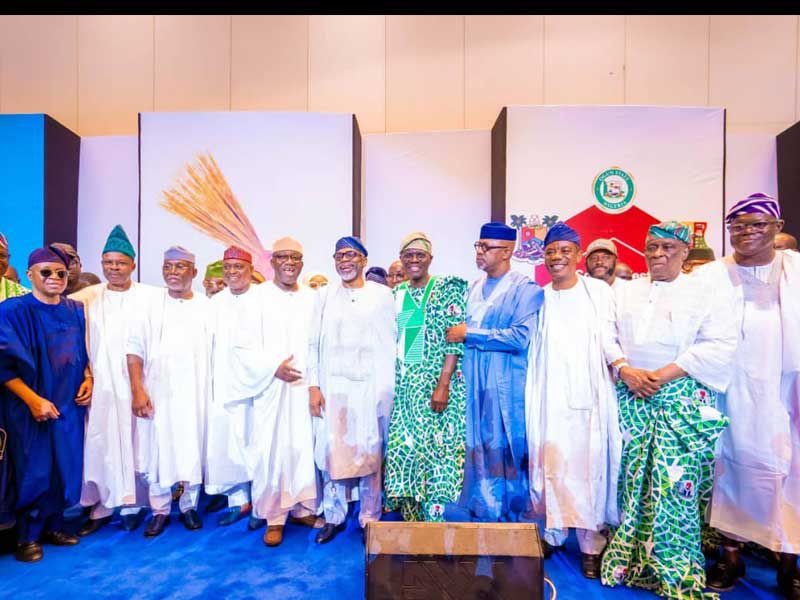
A lot currently rests on the shoulders of the South West geo-political zone, and her leadership is not oblivious of this fact. As a cosmopolitan region with some level of political sophistication, it is one part of the country that has always played a significant role in the nation’s rich political history.
Even more instructive at this time in the life of the nation, is that it is the zone, where the incumbent president, Bola Tinubu, comes from. It is, therefore, a delicate balance – managing her political relevance as well as her irrevocable support for one of her own – the President of Nigeria.
It was against this backdrop that last weekend’s regional assembly by the All Progressives Congress (APC) members secured its place in the new thinking for a better region and nation.
Stomping the meeting hall with flashes of bright colours that typified regional unity and cohesion, the South-west might have set a new agenda in party politics and management.
Chairman of the regional assembly for APC and Lagos State Governor, Mr. BabajideSanwo-Olu seemed to understand the weight of the assignment on his hands and did not disappoint anyone either.
Incidentally, in his case, apart from coordinating activities of the region, he is also the governor of the president’s home state. This, though, makes his job interesting. It is certainly not an enviable one either.
But the Lagos governor seemed to be up to the task. The fact that he and his team could come up with an idea that suddenly birthed the somewhat reunion of the political leadership of the zone was not a mean feat.
Assembled in an expansive hall at the Eko Hotel and Suites, Lagos, were over 800 people. They ranged from local government administrators to state assembly members, their national assembly counterparts, governors, as well as all the former this and former that.
With evident nostalgia permeating the hall, typified by the near-endless banter from people, who had not seen one another in ages, and wrapped in many shades of beautiful colours, the gathering offered more than it was conceived for and indeed, worth the time of everyone.
“As a key part of the Nigerian State, the Southwest is blessed with immense potential to lead the country towards prosperity,” Sanwo-Olu stated as he began to welcome people to the gathering.
“I warmly welcome you to this significant gathering, where we come together as one family to explore ways to work more closely and effectively for the benefit of our people, our region, and our nation.
“Today presents an opportunity for us to share ideas and agree on strategies to take the Southwest to greater heights. We have abundant human and natural resources, exceptional creativity and intellectual strength, as well as a rich cultural heritage.
“These are the unique assets we can harness to move our region forward and give Nigeria a respected place in the global community,” he said.
According to him, “This meeting is not only an opportunity to reflect on how far we have come as a region but also to reignite hope and chart a course for a better Nigeria – one where poverty and lack are things of the past.
“As a people bound by common values of integrity and respect, we are in a unique position to change Nigeria’s fortunes. The Southwest has always been the heartbeat of this nation, recognised as the pacesetters in innovation and progress.”
To put this in context, he recalled that, “Our past leaders earned this pride of place through their visionary leadership. They built Africa’s first television station (WNTV), West Africa’s first skyscraper (Cocoa House), and Nigeria’s first stadium (Liberty Stadium), all through disciplined management and strategic investment in education and agriculture.
“They banished ignorance and poverty from our region, instilling values of integrity and respect, which gave rise to the ‘Omoluabi’ ethos – the hallmark of honesty and dignity that has shaped our identity.”
This was where it started to get interesting. The poser here: “So, where did we lose our way? At what point did farming become a job we looked down on? How did our land, once rich in opportunity, produce beggars despite its vast potential?
“How did our youth turn into street urchins, kidnappers, and fraudsters? The truth is, we have all fallen short. But today, we have the chance to address these failings, retrace our steps, and rebuild our values.”
Sanwo-Olu, without a doubt, gave an amazing speech that soon set the pace for serious deliberations on the future of the region. The discussions began very quickly.
However, in a full blaze, former governor of Ekiti State, Dr. KayodeFayemi, finally set the stage on fire through his keynote address.
He did not allow the inspiration spurred by Sanwo-Olu to simmer down before riding on the moment.
Building on the foundation laid by the Lagos state governor, Fayemi noted that, “We in the South West wing of our party constitute an important pillar of the APC. I warmly salute and commend the decision to convene this zonal assembly of our party leaders and faithful for various reasons.”
As a foundation member, and one of the many actors, who worked to help create the APC out of a coalition of like-minded parties and actors united by a progressive and forward-looking commitment to national unity and transformation, Fayemi was proud of the zeal with which the cadres in the South West embraced the party’s agenda for change and renewal when it was announced to them.
After reeling off some of the successes of the party, since it came on stream in 2015, he also dwelt on some of the current challenges that have either obstructed the party or thwarted some of her noble plans and as well stymied some of the gains registered.
“Not least among these challenges is the security situation in the country, a problem we inherited and which has continued to be a source of immense worry for all Nigerians, and rightly so. Understandably, the security question remains a topmost priority for President Tinubu.
“Added to this are adverse domestic pressures and external shocks on the economy that have exacerbated the cost of living, and affected our quest to massively dent unemployment, especially as it affects the teeming population of young people.
“We are also confronted with the task of stabilising the exchange rate of our national currency even as concerted efforts are being made to erode the parallel market, increase the capital budget in our national expenditure profile, and meet our various international obligations.
“These are not problems that are easy to tackle, especially as the roots of many of them date back to the locust years of the PDP, and resolving them requires time, patience, and understanding.
“It is correct that as the ruling party, we must confront them frontally without forgetting that we also owe a duty to explain our remedial and reform measures with all the empathy and humility that we can muster,” he explained.
Proud of the road the APC had traveled since it came into existence, Fayemi said, “We cannot afford to rest on our laurels as a party or be complacent about anything. It is imperative that we openly and honestly acknowledge current challenges and develop a coherent and comprehensive plan that can enable us to confront them.
“This we must do by resolutely learning lessons of experience. We should also be ready to mobilise ourselves for the urgent and necessary task of rebuilding the hope of our compatriots both in Project Nigeria and in our ability as a party committed to leading the charge against underdevelopment, disunity, and insecurity.
“Without being defensive or unduly apologetic, we must dig deep to find that combination of humility, a sense of public service, an uncommon courage, and a tenacity of purpose to drive a shared national vision. These qualities served us so well in 2015 to enable us to write an important new chapter in our national electoral history. They can and will serve us well again if we re-commit to them.”
Impressed by the thrust and turn-out at the gathering, President Tinubu, who said his eyes were set on the future generations and not future elections, capped the discussions in a presidential fashion.
The president explained that the reforms being undertaken by his administration might have exposed the party to widespread criticisms, but assured the APC faithful that the “tough” decisions would finally set the country on the path towards prosperity.
Represented by his Chief of Staff, Hon. Femi Gbajabiamila, the president acknowledged the solidarity being shown to his government in the difficult moments and stressed that his focus was not on the next election, but on improving the lives of Nigerians and to hand over a prosperous country to the next generation.
“We acknowledge that our decisions have been tough, but they needed to be taken. The gains are at the end of the tunnel. That time will come when we will all be happy and thank our government for taking those decisions.
“Right now, I am not thinking of the next election but about the next generation. This is why we are implementing reforms that are long overdue. This is the hallmark of a true leader.”
Tinubu promised to give serious deliberations to the issues raised at the forum and further pledged to make the party more united to achieve its programmes.
A former governor of Ogun State, Chief SegunOsoba, declared that the South West must support Tinubu’s administration unequivocally, no matter the price to be paid.
Osoba warned that no matter the ill-feelings anyone might have against the person of the president or his administration, he must be supported not only to run out his first term in office but also to secure a second term.
The veteran journalist disclosed that Tinubu was the first president from the progressive fold and, therefore, could not afford to fail.
“We cannot and should not allow anyone to derail our democracy under Tinubu,” he insisted, adding that no money was left in the national treasury for subsidy when Tinubu took office.
South West Zonal chairman of the APC, Hon. Isaac Kekemeke, said the party stood with the president for his courage to address the malady in the country. He said the caucus meeting was a move to resolve intra party crises and disagreements tearing members apart.
On hispart, APC National Secretary, Senator AjibolaBasiru, said the caucus forum was sanctioned by the party national leadership to create a constant interface between elected members of the party and officials administering the affairs of the party.
He disclosed that similar meetings would be held in other regions in order to galvanise more support for APC and its government.
The idea was no doubt a good one and must be reviewed for sustainability. In fact, the next phase might be to start a similar gathering at the senatorial levels and gradually build up to the states before arriving at the regional level for an expanded and richer deliberation.
Much as the outing was generally adjudged successful by a majority of the people, who attended and those who observed from the outside, the ruling party must continue to speak the truth to itself and the government, away from the aspiration of seeking to hold on to power.
Unfortunately, for an idea that was well received across the South West and attended by all that matter in the region because of its originality and progressive intentions, Sanwo-Olu’s seemingly petty partners in the state assembly, led by the Speaker, Hon MudashiruObasa, boycotted the event. If this is not an obvious infantile disposition, what else could it be?
While the Lagos lawmakers allegedly claimed not to have received an invitation to the event, the state, on the other hand, was said to have record of the invitations extended to them with clarity of thoughts and agenda.
Expectedly, this is what usually happens when people undeserving of any offices at all find themselves in positions bigger than their dreams and intellectual credentials. They are unable to divorce politics from issues and real governance but quick to descend into the gutters at the slightest opportunity.
It is only hoped that this maiden South West Assembly would not end up a one-off exercise but a sustainable initiative that would help the party and region grow her politics and leadership.
As published in Thisday Newspaper
https://www.thisdaylive.com/index.php/2024/10/09/beyond-apcs-flashes-of-many-colours/
Opinion
Dangote Refinery: What Does NNPCL Want Again?
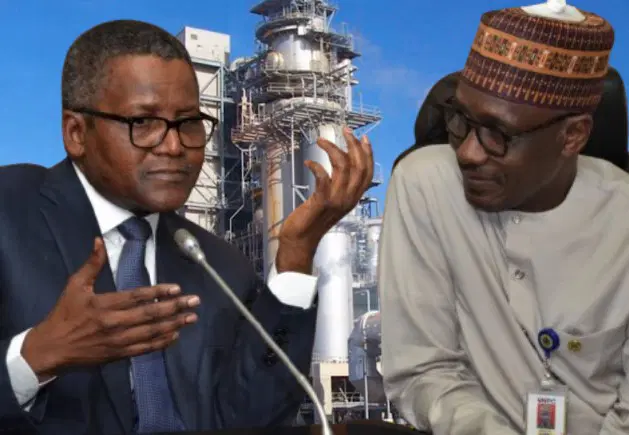
By Igwe Donald
Nigeria’s oil sector is on the cusp of transformation, with fresh perspectives sparking dynamic discussions that reveal the exciting potential for collaboration between stakeholders and the pursuit of national economic growth. Dangote Refinery’s recent press statement has ignited a lively debate about NNPCL’s visionary strategy. The clash between these two titans has exposed a complex web of corruption, greed, and political maneuvering that threatens to undermine Nigeria’s energy security.
The controversy has gained considerable attention due to the critical role of the Dangote Refinery in shaping the future of Nigeria’s energy industry. Despite claims of patriotic intent, the actions of NNPCL, under Kyari’s leadership, have been perceived by many as counterproductive and even conspiratorial.
Based on recent developments, particularly statements and counterstatements from Dangote and NNPCL, it becomes apparent that the battle is more than a mere industry dispute, it is a power struggle with national and international ramifications. Moreover, Kyari’s involvement in past corrupt dealings and the importation of substandard fuel adds a dark layer to an already convoluted situation.
At the heart of this conflict lies a simple question: what does the NNPCL truly want? The answer, as it turns out, is far from simple.
The Genesis of the Conflict
The inauguration of Dangote’s refinery was a landmark achievement for Nigeria’s energy sector. It was a symbol of hope, promising to end the country’s dependence on fuel importation, reduce foreign exchange strain, and address persistent fuel shortages that have plagued Nigeria for decades. Aliko Dangote’s vision was clear: to build a refinery that could refine over 650,000 barrels of crude oil per day, capable of meeting both local and regional demands for petroleum products.
However, this grand ambition did not sit well with all stakeholders, especially the NNPCL. The company, despite its monopolistic control of the country’s oil resources, has faced significant criticism for inefficiency, corruption, and a failure to provide Nigerians with affordable and consistent access to fuel. Under Mele Kyari’s leadership, these issues have only worsened. Instead of collaborating with Dangote to address the nation’s fuel challenges, NNPCL has repeatedly sabotaged the efforts of the refinery, questioning the quality of its products and attempting to control its pricing structure.
In an attempt to undermine Dangote’s progress, NNPCL began circulating narratives that the refinery would sell fuel at an exorbitant price of N898 per liter, a claim which Dangote promptly dismissed as “misleading and mischievous.” In a press statement, Dangote clarified that the refinery had sold its products to NNPCL in dollars, offering significant savings compared to the imports the NNPCL typically brings in. By doing so, Dangote was not only addressing the country’s fuel needs but also reducing the financial burden on Nigerians by keeping fuel prices reasonable.
NNPC: A Legacy of Exploitation and Its Reluctance to Change
What many don’t know is that, the current drama between NNPCL and Dangote is not an isolated incident but rather a symptom of a much larger problem that has plagued Nigeria for decades: the deep-rooted culture of exploitation within the oil sector. For far too long, NNPC (now NNPCL) has operated as a behemoth of inefficiency and corruption, enabled by a political elite more concerned with personal enrichment than national development.
Established in 1977, the Nigerian National Petroleum Corporation was intended to ensure that Nigeria could maximize its oil wealth for national development. Instead, the organization has often functioned as a vehicle for personal and political gain, mired in scandals involving missing funds, corrupt contracts, and fraudulent deals with foreign oil companies.
The current leadership under Mele Kyari is a continuation of this legacy. While Kyari portrays himself as a reformist, his actions suggest otherwise. His involvement in questionable fuel importation deals, particularly from Malta, is not just a footnote in his career but a key indicator of his intentions. His decisions, both public and behind closed doors, appear designed to maintain the status quo that benefits a select few while keeping the majority of Nigerians in a perpetual state of fuel scarcity, high prices, and dependence on foreign products.
NNPCL’s reluctance to embrace local refining capabilities, as demonstrated in its antagonism toward Dangote Refinery, suggests that the corporation is not interested in Nigeria becoming self-sufficient in fuel production. Instead, it seeks to retain its grip on the industry, using crude oil sales as leverage while engaging in backdoor dealings with international partners who continue to siphon Nigeria’s wealth abroad.
Mele Kyari and the Maltese Syndicate of Corruption
To fully grasp the depths of the ongoing conflict, one must look into the murky dealings of Mele Kyari and his long history of involvement in corrupt activities. Kyari has been repeatedly fingered in cases of importing substandard fuel into Nigeria. These dealings, often orchestrated through Malta-based syndicates with refineries abroad, have cost Nigeria billions in revenue while exacerbating the country’s energy crisis.
Kyari’s involvement in these syndicates points to a larger conspiracy designed to undermine local refining efforts, such as Dangote’s, and maintain Nigeria’s dependence on foreign fuel imports. The motive is clear: Kyari and his foreign partners stand to profit enormously from keeping Nigeria trapped in a cycle of importation, even as local refineries remain underutilized or sabotaged.
The Dangote Refinery, in this context, represents an existential threat to Kyari’s interests. By producing fuel locally at a fraction of the cost of imported fuel, Dangote’s refinery could potentially collapse the entire importation scheme, cutting off the illicit profits that Kyari and his associates have long enjoyed. This explains the relentless efforts to discredit Dangote’s refinery, first by questioning its quality and later by attempting to manipulate its pricing.
Dangote’s Fight for Transparency and the Battle for Control
Faced with NNPCL’s calculated sabotage, Dangote launched a counteroffensive, exposing the corporation’s true intentions. In a series of media appearances, Dangote debunked the claims of substandard products by presenting evidence of his refinery’s superior quality compared to the imported fuels that Nigerians had long been forced to endure. By making his case publicly and transparently, Dangote effectively dismantled the quality-based narrative being pushed by NNPCL.
However, this was only the beginning. Realizing that they could not win the battle over quality, Kyari and NNPCL shifted focus to pricing. Their strategy was simple: manipulate the public into believing that Dangote’s refinery would price its products excessively high, thereby allowing NNPCL and other foreign marketers to raise their own prices to exorbitant levels, all while blaming Dangote for the hikes and become frustrated to give up.
The hypocrisy in this approach is glaring. NNPCL, which sells crude oil to Dangote’s refinery just as it does to foreign oil companies, has no business controlling the refinery’s pricing. Yet, in a blatant display of power, the corporation demanded that it would set the price at which Dangote could sell his fuel. This action of theirs has is an absurd situation, but one that reveals NNPCL’s deeper motives: to maintain control over the pricing of fuel in Nigeria and keep Dangote’s refinery from offering cheaper, more accessible alternatives to the public.
The International Implications: Challenging the Global Oil Cartel
This battle between Dangote and NNPCL has obviously not gone unnoticed by the global oil industry. For decades, international oil companies have profited from Nigeria’s dependence on imported fuel, with major deals brokered between Africa and Europe that ensure these companies’ continued dominance over the continent’s energy sector. The success of Dangote’s refinery, however, threatens to disrupt this dynamic.
By producing high-quality fuel at a lower cost, Dangote’s refinery could potentially redirect the flow of oil trade in Africa. Countries with weak or devalued currencies, which currently struggle to buy oil in dollars, would find a more affordable option in Nigeria’s locally refined products. This would not only boost Nigeria’s influence in the African oil market but also diminish the power of European oil companies that have long held a stranglehold on the continent’s resources.
This potential shift in the oil trade has likely played a role in the aggressive stance taken by NNPCL and its foreign partners. As the refinery begins operations, there is a palpable sense of urgency among those who stand to lose the most from its success. Kyari’s alliance with these foreign powers, which include oil marketers and refinery owners in places like Malta, underscores the extent to which Nigeria’s energy future is being shaped by external forces with little regard for the country’s best interests.
The Future of Nigeria’s Energy Sector
In any society where corruption reigns unchecked, the role of the public becomes crucial. The ongoing feud between NNPCL and Dangote has made it clear that corporate power and government influence can often work hand in hand to distort the truth and manipulate public perception. This is why patriotic Nigerians must play a central role in demanding transparency and holding our leaders accountable.
As the battle between Dangote and NNPCL continues to unfold, it is clear that the stakes are incredibly high. At the heart of the conflict is not just the future of Nigeria’s energy sector but the broader question of who will salvage the country’s economic destiny. For decades, Nigeria has been held back by corrupt leaders and foreign interests who have exploited its resources for personal gain. Dangote’s refinery represents a challenge to this status quo, offering a vision of an independent Nigeria that can provide for its own energy needs without relying on foreign imports.
While Dangote’s refinery promises a solution to the decades-long fuel crisis, its survival depends on more than just its operational success. It depends on the will of the Nigerian people to recognize the larger forces at play and to stand up against the manipulations of entities like NNPCL. Public pressure has already shown its power—Dangote’s media campaign successfully exposed NNPCL’s dubious tactics and forced them to retract their claims. This is a victory for transparency, but it must be the first of many.
Yet, as NNPCL’s actions have shown, there are powerful forces determined to prevent this vision from becoming a reality. Mele Kyari’s sinister motives, driven by a desire to maintain control over Nigeria’s oil industry and protect the illicit profits of his foreign allies, have led to a concerted effort to sabotage the Dangote Refinery and undermine its potential benefits for the Nigerian people.
In the face of these challenges, Dangote’s determination to fight back offers a glimmer of hope. His willingness to engage the public, expose NNPCL’s corruption, and champion the cause of transparency and accountability sets him apart from the many business and political leaders who have allowed Nigeria’s energy sector to be exploited for decades.
The outcome of this battle is far from certain. However, one thing is clear to all: Nigeria stands at a critical crossroads. The decisions made in the coming months will determine whether the country can finally break free from the chains of oil dependency and corruption or whether it will remain trapped in a cycle of exploitation, benefiting a few at the expense of the many. The Dangote Refinery holds the key to unlocking a brighter future, but only if it can overcome the formidable obstacles placed in its path by those who seek to maintain the status quo.
A Call for Institutional Reform and Accountability
The NNPCL-Dangote conflict highlights the urgent need for institutional reform in Nigeria’s oil sector. As long as entities like NNPCL are allowed to operate with impunity, prioritizing personal gain over national interest, Nigeria’s energy sector will remain dysfunctional. Reforming NNPCL will require more than just leadership changes, it will require a complete overhaul of its operational structure, with a focus on transparency, accountability, and efficiency.
At this point, President Bola Ahmed Tinubu must step in, he must rescue Nigeria from the hands of devourers. Mr President must ensure that this reform must start with strengthening regulatory bodies tasked with overseeing the oil sector. These bodies must be empowered to hold NNPCL and other players accountable, ensuring that they operate in the best interest of the Nigerian people. Additionally, there must be stricter penalties for corruption within the industry, with real consequences for those who engage in illicit activities like fuel importation scams and price manipulation.
Furthermore, Nigeria must develop a robust framework for supporting local refining efforts. This includes providing incentives for other private investors to follow in Dangote’s footsteps, fostering competition, and ensuring that no single entity—whether NNPCL or Dangote—holds a monopoly over the country’s oil resources. A diversIfied and competitive oil sector is key to ensuring that Nigeria can meet its energy needs while protecting consumers from price gouging and supply shortages.
Conclusion
As this reality keeps unfolding, Nigerians must brace themselves for the challenges that lie ahead. The battle between Dangote and NNPCL is far from over, and the outcome will have profound implications for the country’s future. Mele Kyari’s corrupt dealings, his collusion with foreign oil marketers, and his attempts to sabotage Dangote’s refinery all point to a deeper crisis within Nigeria’s oil sector.
Yet, despite these challenges, there is reason to hope. Dangote’s refinery represents a new beginning, a chance for Nigeria to take control of its own energy future and end the cycle of dependence and exploitation that has held it back for so long. However, achieving this goal will require vigilance, transparency, and a willingness to confront the powerful interests that seek to maintain their grip on Nigeria’s oil industry.
In the coming months, as fuel prices shift and the propaganda war intensifies, Nigerians must remember one thing: the future of their country is in their hands. If they stand by Dangote’s vision for a self-sufficient Nigeria, they can reclaim control over their energy destiny. If they allow NNPCL’s manipulations to succeed, the cycle of dependency and exploitation will continue. The choice is clear, but the road ahead is fraught with challenges. The rainy season is indeed upon us—whether it brings renewal or devastation depends on the actions taken today.
Nigerians must remain vigilant as fuel prices begin to fluctuate and as NNPCL’s propaganda continues to spread. Informed citizens can resist the temptation to accept false narratives at face value and must seek out the truth behind the machinations of the oil industry. Furthermore, Nigerians should advocate for stronger regulatory mechanisms that prevent corporate sabotage, while also pushing for more significant oversight of the oil sector to prevent future exploitation by foreign interests and corrupt officials.
The path forward will not be easy, but it is clear that the stakes are too high for inaction. Nigerians must demand more from their leaders and corporations. They must hold Mele Kyari and NNPCL accountable for their actions and insist on a future where Nigeria’s oil resources benefit the many, and not the few. As Dangote’s refinery begins production, the hope is that it will usher in a new era of energy independence and prosperity for Nigeria. But this hope will only be realized if the forces of corruption and exploitation are confronted head-on and defeated.
Right now, the future of Nigeria’s energy sector hangs in the balance. It is imperative that the government intervene to put an end to the corrupt practices of the NNPCL and ensure that Dangote Refinery is allowed to operate freely.
By doing so, Nigeria can take a significant step towards a brighter future, one in which its citizens have access to affordable, reliable energy. The stakes are high, but the rewards are even greater.
Donald is a public affairs analyst and wrote this piece from Agege, Lagos State
Opinion
Dr. Bello Matawalle: Digitising Nigeria’s Military Pensions Verification Process
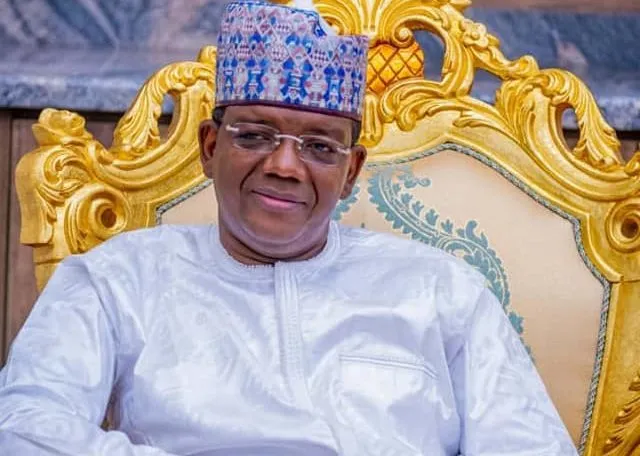
For decades, Nigeria’s retired military personnel have been compelled to travel hundreds, sometimes thousands, of kilometers—particularly for those abroad—merely to fulfill the annual requirement of verifying their identities at the Military Pensions Board. This antiquated system, both costly and time-consuming, has placed an undue strain on the lives and resources of Nigeria’s veterans.
The Nigerian Military Pensions Board, the institution tasked with managing retirement benefits for military retirees and administering death benefits to their next of kin (NOK), has long relied on physical verification exercises to validate the status of eligible pensioners within its database.
Historically, these verification exercises required veterans or their NOK to appear in person at designated centers for authentication.
A turning point came just a few months ago. Under the stewardship of Dr. Bello Matawalle, the Nigerian Military Pensions Board (MPB) introduced a fully digitized system for the verification of military pensions. This modernization allows for seamless, electronic verification of pensioners, whether they reside within Nigeria or abroad, using secure identification such as international passports, National Identity Numbers (NIN), or driver’s licenses.
This initiative represents a watershed moment in ensuring the continued welfare of Nigeria’s veterans.
By transitioning to a digitized system, Dr. Matawalle has not only mitigated the physical and financial toll once imposed on veterans and their families but also eradicated the need for arduous travel to verification centers. Pensioners can now complete the verification process from the comfort of their homes, regardless of their geographic location.
This digital transformation brings unparalleled convenience and accessibility. Veterans can now authenticate their status with ease, from any corner of the globe, obviating the risks associated with long-distance travel.
Beyond convenience, this overhaul results in significant savings in both time and resources. Veterans once burdened by exorbitant airfare and accommodation costs to fulfill their obligations now find their finances preserved.
Equally important, the new digital process curtails human error, ensuring the accuracy of pension records nationwide. It ensures the use of robust, secure identification methods that significantly reduce the risk of fraud, guaranteeing that only eligible beneficiaries receive their entitlements.
In an era where efficiency and security are paramount, Dr. Matawalle’s reforms exemplify the promise of technology in public administration. By embracing digital innovation, the Military Pensions Board has not only streamlined a burdensome process but also reinforced the dignity of Nigeria’s veterans, ensuring they are accorded the respect and ease of service they deserve in retirement. This is a model of modern governance that other sectors would do well to emulate.
Nathaniel C. Adoji writes from Kaduna
-
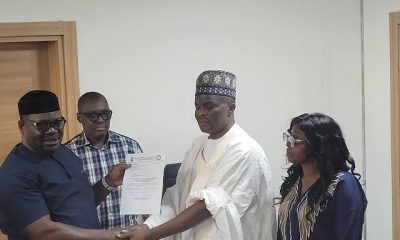
 Business14 hours ago
Business14 hours agoOkpella Monarch: Obaseki Ratified Kingmakers Decision, End 5years leadership Vacuum
-

 Banking10 hours ago
Banking10 hours agoFree Food Saga: Akpabio quoted out of context-CSO
-

 Foreign15 hours ago
Foreign15 hours agoSci-tech innovation fuels China’s high-quality development
-

 Entertainment7 hours ago
Entertainment7 hours agoDavido Declares ‘Timeless’ His Best Album
-

 Entertainment7 hours ago
Entertainment7 hours ago‘Adire’ Secures Four Nominations at the Best of Nollywood Awards
-
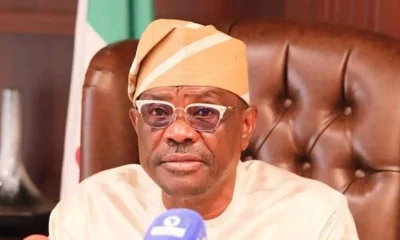
 Business7 hours ago
Business7 hours agoWike Urges Nigerians to Pay Taxes for Improved Social Services
-

 Foreign9 hours ago
Foreign9 hours agoQinling Mountains better safeguarded with comprehensive digital platform
-
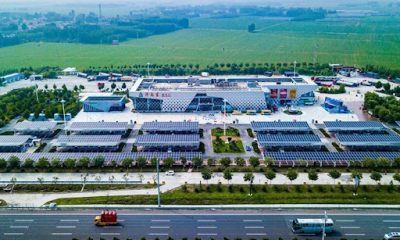
 Foreign9 hours ago
Foreign9 hours agoExpressway service station in Shandong achieves carbon neutrality





